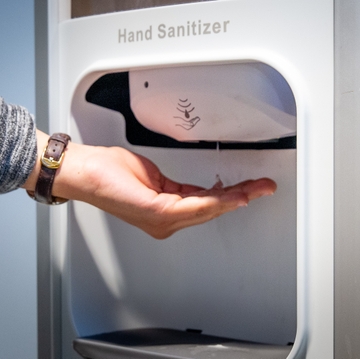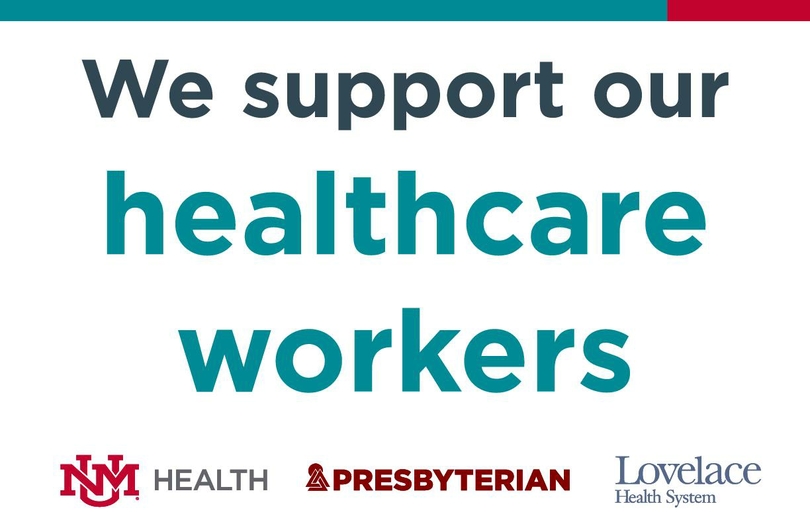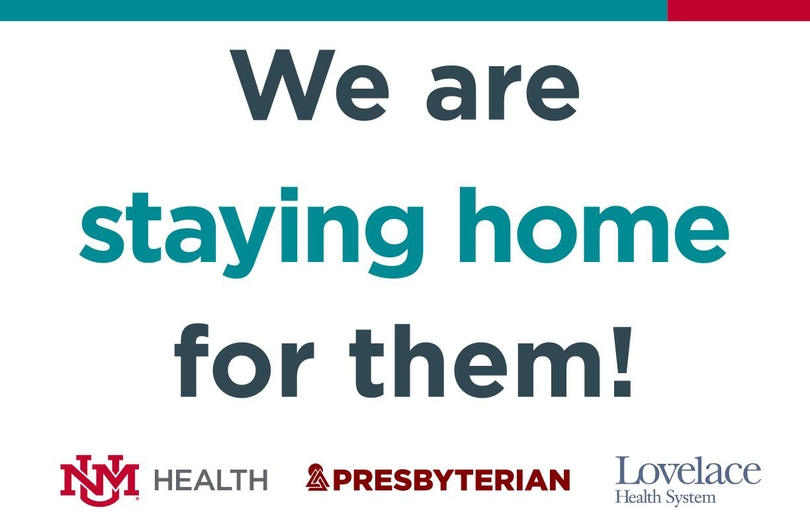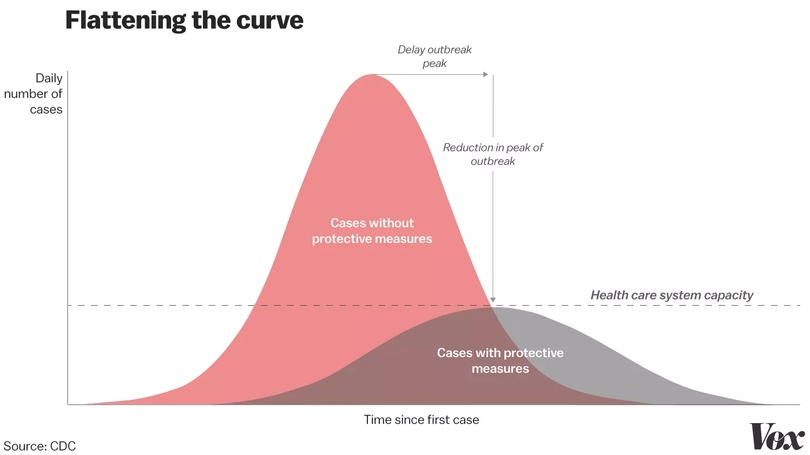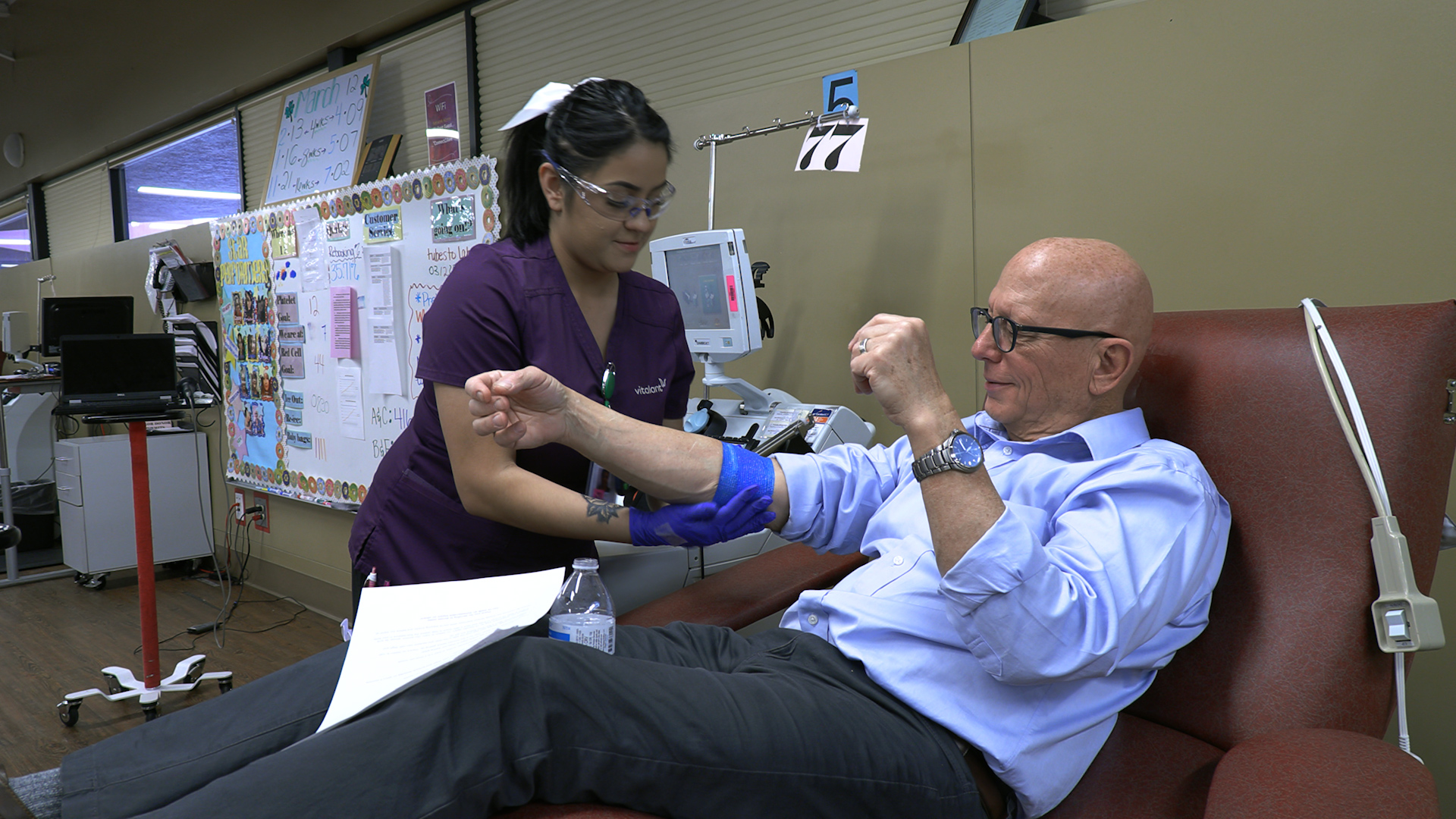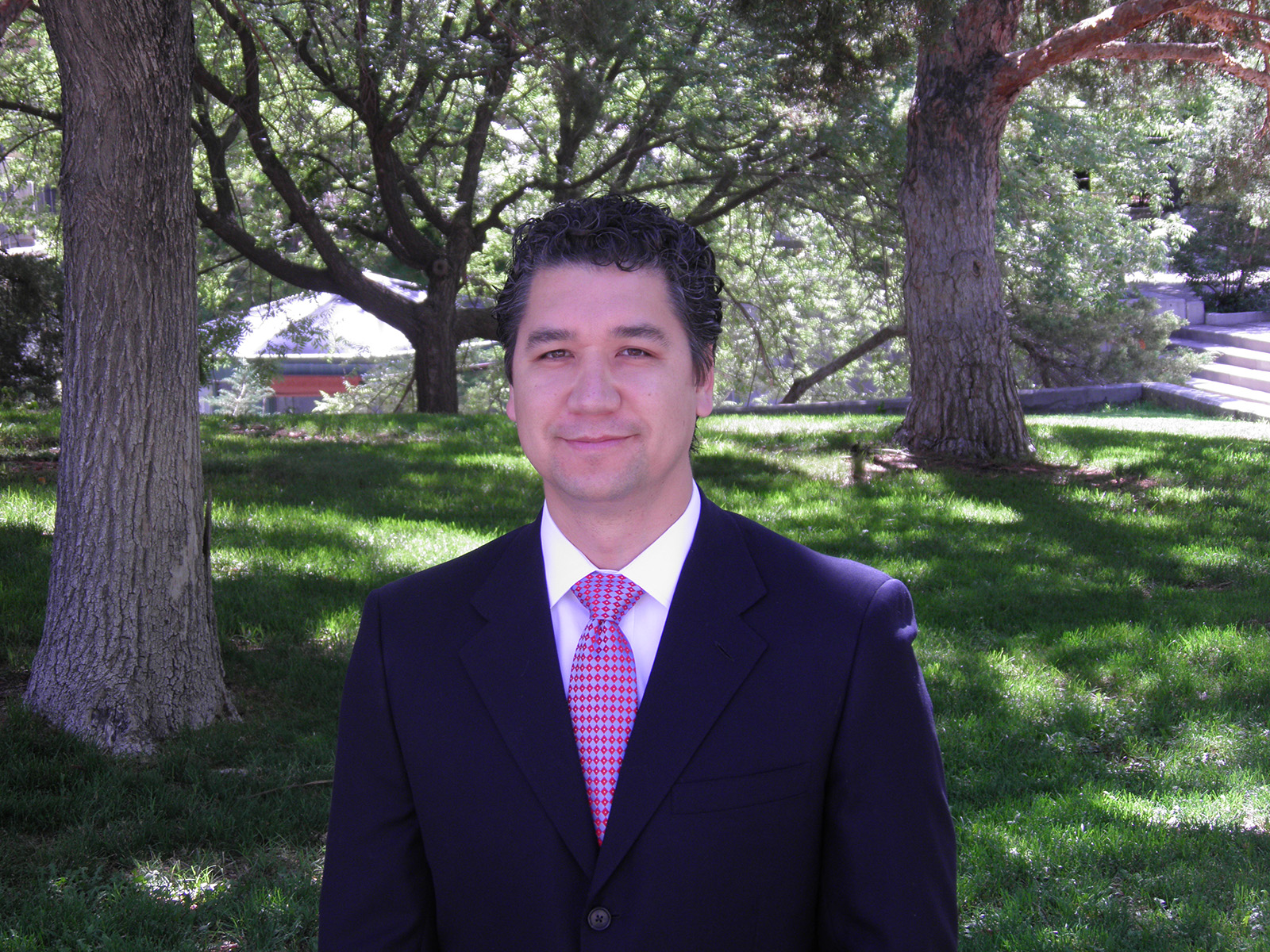March 23, 2020
Latest Developments in the Global COVID-19 (Coronavirus) Outbreak
Here's What New Mexicans Need to Know
UPDATED APRIL 23, 2020 (6:00 p.m.)
Dr. John Marek, vascular surgeon and Vice-Chair of Surgery at The University of New Mexico Health Sciences Center talks about his experience interacting with co-workers on the front lines of dealing with the coronavirus crisis.
UPDATED APRIL 5, 2020 (3:00 p.m.)
QUERENCIA
----
UPDATED APRIL 3, 2020 (10:00 a.m.)
UNM Foundation Creates Fund for UNMH Health Care Workers
Many people in the community are looking for ways to help our physicians and staff who are working tirelessly to care for patients during the COVID-19 crisis.
Now, the University of New Mexico Foundation has launched the UNM Hospital Employee Crisis Relief Fund to receive philanthropic support for this purpose.
"We have created a giving page where people can directly support these efforts," says Anndee Wright Brown, senior director of development for the foundation. "This fund will be in effect through the current COVID 19 pandemic and can be made available during other future crisis events."
The fund will be used to help UNMH health care workers with additional costs -- such as food and lodging -- that accompany their long hours caring for hospitalized patients.
For more information, please visit the UNM Foundation website.
----
UPDATED MARCH 31, 2020 (10:00 a.m.)
Show Your Support for Our Health Care Workers!
UNM Health, Presbyterian Healthcare Services and Lovelace Health System have joined forces with the New Mexico United soccer team to support our health care workers. Today, (Tuesday, March 31), you can go to the New Mexico United shop at 3500 Central Ave. SE, (at the corner of Central Avenue and Carlisle Boulevard), to donate blood and pick up a yard sign that shows your support of our wonderful health care workers who are looking after us during this difficult time.
Even if you can't make it down to the shop today, you can create your own yard signs by printing out the above PDF files. Also, don't forget you can donate blood anytime by going to the Vitalent blood collection center at 1515 University Blvd. NE in Albuquerque, or finding your local donation center by visiting the Vitalent website.
----
UPDATED MARCH 30, 2020 (4:45 p.m.)
Coronavirus Clinical Trials Launched at UNM Hospital
The University of New Mexico Hospital this week will launch its first two clinical trials of potential drug therapies to treat patients who have fallen ill from the novel coronavirus. The move is part of an urgent nationwide push to test potential treatments for the infection.
Nearly 150,000 Americans have tested positive for coronavirus infection so far, and more than 2,500 people have died - and a surge of new cases is predicted in coming weeks. But drugs are now becoming available that may potentially reduce mortality.
UNMH patients who have tested positive for the virus and are exhibiting pneumonia symptoms, may be offered treatment with remdesivir, an antiviral drug manufactured by Gilead Sciences, Inc., said Richard S. Larson, MD, PhD, executive vice chancellor and vice chancellor for research at the UNM Health Science Center.
Michelle S. Harkins, MD, chief of UNM's Division of Pulmonary, Critical Care and Sleep Medicine, is taking the lead on that study. "We are working actively with Gilead to have this in place by the end of the week," she said. "I have one patient on the drug now and am looking to enroll more."
Remdesivir was developed to fight Ebola and Marburg viruses and has shown some activity against the MERS and SARS infections, which are related to the current coronavirus.
Patients at UNMH with a positive COVID-19 test who do not have pneumonia may be treated with a combination of the anti-malarial drug hydroxychloroquine, and azithromycin, an antibiotic.
Clinical trials of hydroxychloroquine are already underway at Columbia University, New York University and the Mayo Clinic.
Hydroxychloroquine, which is also used to treat lupus and rheumatoid arthritis, has been a frontline treatment for malaria for more than 60 years. Laboratory studies have suggested that it might be effective against the novel coronavirus.
The U.S. Department of Health and Human Services has accepted a donation of 30 million doses of hydroxychloroquine sulfate from a pharmaceutical manufacturer, along with a million doses of a related compound called chloroquine from another manufacturer, for distribution to patients.
And over the weekend, the U.S. Food and Drug Administration issued an Emergency Use Authorization to allow the drug to be distributed and prescribed to teen and adult COVID-19 patients when a clinical trial is not available. Meanwhile, the National Institutes of Health and other federal agencies are planning clinical trials.
Hydroxychloroquine was released with FDA action today from the national strategic reserves for patients in clinical trials, meaning UNMH will soon have a supply of the drug on hand for research studies.
----
UPDATED MARCH 25, 2020 (4:00 p.m.)
Nurses Have a Major Role to Play in Limiting the Coronavirus Pandemic
Nurses are on the frontline of the novel cornavirus pandemic. Now is the time to take lessons from across the world to help stop the spread of COVID-19 and protective measure be in place to protect those frontline workers.
Mary Pat Couig, PhD, MPH, RN, associate professor in the UNM College of Nursing, has joined with two other nursing experts in disaster and public health emergency preparedness to publish a battle plan for nurses to take aggressive actions to protect colleagues, patients, themselves.
Their article, published in the American Journal of Nursing, urges that to meet the anticipated demand for health care services due to the pandemic, health care systems must:
- Implement crisis staffing contingency plans,
- Expand the workforce as soon as possible, and
- Ensure the health and safety of all nurses through stringent observation of infection prevention and control measures and access to personal protective equipment.
"It is incumbent upon all U.S. nurses to take aggressive actions to protect our colleagues, our patients, and ourselves," they write.
-----
UPDATED MARCH 25, 2020 (2:00 p.m.)
PLEASE STAY AT HOME SO YOUR HEALTH CARE PROFESSIONALS CAN STAY AT WORK
Many of you are worried about what is happening with the novel coronavirus outbreak, and naturally, you want to help. You can help by staying at home and only going out if absolutely necessary. By staying at home you help stop the spread of the virus and let us at the hospital go to work and take care of those who need our help the most.
EN ESPAÑOL:
DINÉ:
VIETNAMESE:
AMERICAN SIGN LANGUAGE:
----
MARCH 23, 2020 (2:15 p.m.)
CARE FOR THE CAREGIVERS
Everyone is experiencing heightened anxiety due to the novel coronavirus outbreak, but frontline health care workers whose job it is to provide care to infected patients have greater cause for worry.
Elizabeth Lawrence, MD, director of the Office of Professional Wellbeing in the UNM School of Medicine, is looking for ways to help health care workers alleviate their stress. She has distributed a list of digital resources that health care workers can tap into to help alleviate their stress.
"If you're on the front line and you know you're exposed to people who may be symptomatic, you worry about bringing it back to your family," says Lawrence, who says professional well-being depends on efficiencies of practice, a culture of wellness and personal resiliency.
"In this crisis, the institution has been much more nimble," Lawrence says. Newly instituted provisions for telephone consults, changes in access to UNM hospitals and clinics and changes in triage have created greater efficiencies, relieving some of the burden for providers, she says.
Lawrence has organized online support groups for providers and community benefactors have been arranging for food deliveries for hospital providers and staff. "It's about promoting a culture of kindness," she says. "We're there to support each other during this challenging time."
Personal resiliency entails self-care for people who are putting their health and well-being on the line. "It's making sure that people have a place to debrief when you're a frontline provider," Lawrence says. "It's level of pressure that's extreme, and people need a place to process that."
Because health care providers see their role as caring for others, they may feel reluctant to share their own concerns and vulnerabilities. "At a time when everyone in the country is so anxious, it's not like you can call up your friend and tell them how anxious you're feeling," she says.
Lawrence is exploring creating an online forum limited to providers where they could share their concerns and experiences with one another. Her office is also trying to create a visual art space, where people could share photos or art as a way of expressing their feelings.
She has also shared with colleagues links to online yoga and exercise instruction, as well as the Headspace and Ten Percent Happier meditation apps, both of which are offering free memberships to anyone with an National Provider Identifier (NPI) number.
Practical considerations, like finding child care for Tier 1 employees who must report to work at the hospital, has also been a concern. Jessica Kelly in Chancellor Paul B. Roth's office has been working to build resources to meet that need.
Lawrence thinks her office also has a role to play in keeping the HSC community socially connected with one another, even when practicing social distancing. "There's this idea that the world is so upside-down, so what sort of stability and normalcy and sense of calm can we provide?'
As one strategy, she's considering organizing virtual book clubs and dinner parties for students. "The idea is to come together, even if we can't see each other," Lawrence says.
"This pandemic has brought laser focus to the fact that we need a healthy workforce," Lawrence says. "If our workforce is out on 14-day quarantine, who's going to take care of the population? How we take care of our physical and mental health is important. You need your workforce, and they need to be healthy."
----
MARCH 20, 2020 (9:30 a.m.)
CORONAVIRUS HOTLINE UPDATE
On an ordinary day, the New Mexico Poison and Drug Information Center receives about 60 calls concerning things like snakebites and accidental drug overdoses.
But since the center took on the responsibility for manning the state's toll-free COVID-19 hotline, specialists are handling an additional 500 calls per day from worried New Mexicans, says center director Susan Smolinske, PharmD.
Calls to the hotline - 1-855-600-3453 - are answered on-site by an expanded staff that includes students from The University of New Mexico College of Pharmacy. Where appropriate, some callers are directed to a nurse advice line, a dedicated line established for physicians and a general line for non-medical questions, Smolinske said.
The high volume has created six- to eight-minute wait times before calls are answered, but if callers are patient, their questions will be answered. Many of the calls are from people who have been swabbed for the COVID-19 test and are seeking their test results - but the call staff does not have access to that information.
"They should not be calling here to get test results," says Jacqueline Kakos, health education consultant for the Poison Center. "Those should come from their health care provider."
Kakos adds that everyone should be wary of unsolicited calls from someone pretending to be from the health department promising to release coronavirus testing results in exchange for Social Security or Medicare numbers.
----
MARCH 18, 2020 (2:30 p.m.)
WARNING: COVID-19 HOTLINE SCAM
Please be aware that there are several phishing scams in which the caller impersonates a representative from the COVID-19 Hotline or other medical entity. The scammer is asking for personal information, such as Social Security number and date of birth, and telling callers they must have that information in order to release COVID-19 testing results.
Representatives from UNM Health, Presbyterian Healthcare Services and Lovelace Health System want to remind the public that we will never ask for your Social Security number. Any confirmation of a positive COVID-19 swab test will be made by the clinic where you were seen or the New Mexico Department of Health.
----
MARCH 17, 2020 (5:30 p.m.)
UNM HOSPITAL STATUS UPDATE
Steve McLaughlin, MD, chair of Emergency Medicine in The University of New Mexico Hospital, gives us an update on how the hospital is dealing with the novel coronavirus outbreak.
----
MARCH 17, 2020 (4:45 p.m.)
UPDATED -- MARCH 18 (2:15 p.m.)
UNMH, SRMC BEGIN VISITOR RESTRICTIONS
The University of New Mexico Hospital (UNMH) and Sandoval Regional Medical Center (SRMC) have implemented restrictions on visitors. At this time, we're highly discouraging visitors to the hospitals in an effort to reduce the chances of spreading the coronavirus (COVID-19).
The health and safety of our patients, visitors, health care workers and staff are our top priorities, and that's why we've temporarily revised the UNM and SRMC visitor policies in light of COVID-19.
- Patients awaiting COVID-19 results aren't allowed to have visitors at this time. We're encouraging loved ones to keep in touch with patients by telephone or by using FaceTime, Skype, WhatsApp and other online platforms.
- Visitors who are sick or not feeling well aren't allowed to enter UNMH or SRMC, unless they're seeking care.
- Visitors may be screened for illness upon entry to the hospital, or we may take your temperature to rule out a fever.
- Only one visitor at a time is allowed for each non-COVID adult patient.
- All visitors must be 14 years or older, unless seeking care.
- Visitor special circumstances -
- Two visitors per patient will be permitted for pediatric patients and patients undergoing end-of-life care; at UNMH, this also applies to labor and delivery patients.
- Visitors will be instructed to remain in the room for the duration of the visit and should not visit common areas such as cafeterias, waiting rooms, lobbies and gift shops.
- Visitors will be asked to follow hand hygiene protocol, using hand gel or soap and water while limiting surfaces touched before entering patient rooms.
----
MARCH 16, 2020 (3:00 p.m.)
TIPS AND TRICKS FOR HOLDING VIRTUAL MEETINGS
With so many of us now moving toward meeting during the work day "virtually" rather than in person, we offer you some tricks and tips for making these meetings productive and worthwhile. You can find many more suggestions for virtual meetings at this link: How to Run a Great Virtual Meeting.
----
MARCH 14, 2020 (6:00 p.m.)
UNM HOSPITAL ESTABLISHES RESPIRATORY CARE CENTER
The University of New Mexico Hospitals has established a walk-up, 24/7 Respiratory Care Center located at the main UNM Hospital near the Emergency Department. We want to stress that in order to ensure that there are enough testing kits in New Mexico, we will only be testing individuals with respiratory symptoms and a history of travel to a state with a known COVID-19 outbreak, or a level 2 or 3 country, as defined by the Centers for Disease Control and Prevention.
----
MARCH 14, 2020 (1:30 p.m.)
COVID-19 HOTLINE FAQs
The New Mexico Department of Health and the New Mexico Poison and Drug Information Center are operating an information hotline - 1-855-600-3453 - for the public and health care professionals with questions about the COVID-19 novel coronavirus.
What the hotline does:
- Provides health guidance if you think you might be experiencing symptoms of the novel coronavirus, including dry cough, high fever or shortness of breath. You should call the hotline first before seeking medical treatment.
- May recommend that people self-isolate, particularly if they're experiencing symptoms suggestive of COVID-19 infection. Operators will help them determine the next best step.
- Offers guidance to health care providers seeking to test a patient or who have questions about the novel coronavirus.
What the hotline does not do:
- It does not issue clearances to return to work - that is up to each individual's employer to decide.
Health Precautions
Gov. Michelle Lujan Grisham and the New Mexico Department of Health are strongly discouraging non-essential travel outside of the state at this time. Meanwhile:
- Remain home from work or school if you are sick and call the hotline at 1-855-600-3453 if you experience any COVID-19 symptoms.
- Continue taking common-sense steps to protect your health and the health of others, such as covering your cough or sneeze and washing your hands frequently with soap and water for at least 20 seconds.
For additional information, please visit the New Mexico Department of Health COVID-19 website. For all non-health-related questions, please call 1-833-551-0518
----
MARCH 13, 2020 (1:30 p.m.)
NEED FOR BLOOD DONATIONS REMAINS HIGH AMID CORONAVIRUS FEARS
As anxiety surrounding the spread of infectious COVID-19 novel coronavirus touches nearly every facet of American life, blood banks are seeing a precipitous drop in donations, which puts patients who need transfusions at serious risk.
University of New Mexico physicians want people to know that the need for blood donations for trauma victims and other seriously ill patients remains constant, and they are asking members of the public to step up.
"I know there's a lot of fear surrounding the coronavirus these days," said Sonlee West, MD, an associate professor and director of trauma services at UNM Hospital. "I want to encourage people to continue to donate blood or consider donating blood for our cancer patients and trauma victims."
The drop in blood donations is being felt here in New Mexico, especially as businesses and schools are canceling scheduled blood donation events, said Lizabeth Rosenbaum, MD, medical director for Vitalent (formerly United Blood Services) in New Mexico and Texas.
The New Mexico-Texas region has seen donations from its mobile blood drives drop by 60 percent in the past week, Rosenbaum said, and nationally, the blood bank network has seen a 17 percent decline in the number of donors coming in to blood centers.
Mobile blood drives entail bringing a bus or van equipped to receive donations to businesses and schools, and they normally account for about 60 percent of the blood supply, Rosenbaum said.
"Businesses are saying that their national offices are not allowing them to have any blood drawings," she said. "Others are just saying, 'We're scared - we just don't want to have blood drives.'"
The drop in donations is dangerous, because UNM Hospital has a continuous need for fresh supplies of donated blood, Rosenbaum said.
"As more and more drives are cancelling, these numbers will continue to get worse," she said. "Because the cancellations are happening to our organization nationwide, having blood brought into our region will not be possible."
Patients need not fear exposure to novel coronavirus if they visit the Vitalent blood collection center at 1515 University Blvd NE in Albuquerque, where infection control measures are in place and procedures for ensuring sterile blood donation are standard practice, Rosenbaum said.
----
MARCH 13, 2020 (11:55 p.m.)
STAYING EMOTIONALLY WELL AMID THE COVID-19 NOVEL CORONA VIRUS OUTBREAK
Social distancing has been proven to be one of the most effective means of stemming the spread of the COVID-19 novel coronavirus. Unfortunately, social distancing - such not attending large outdoor events with 100 more people - also means not venturing out into public as much and not doing some of the things you enjoy, like going to work or church, and not getting to see many of the people you care about.
Paradoxically, social distancing makes it harder to find social support at a time when we might need it the most. But if we are creative, we can explore ways to enhance our self-care. Here are a few tips from Shawn Sidhu, MD, associate professor in the UNM Department of Psychiatry & Behavioral Sciences, for staying mentally and emotionally healthy during this time.
Social distancing does not mean social isolation. We often think, "I wish I had more time to spend with my loved ones." Here's the good news: while social distancing preclude attendance at large gatherings, you could actually get to spend more one-on-one time with your family. Think of it as an opportunity to have the kind of conversations you dream about. Try busting out the old board games, and doing various activities with one another. For those living alone, a great use of technology would be to reach out to loved ones via video chat to stay connected. Long hours of isolation are unhealthy for everyone.
Social distancing does not mean that you cannot go outside. Actually, scientists say, exposure to fresh air helps reduce the spread of viruses. Research also underscores the positive impact of exercise on the immune system. So take this time to take hikes or play ball in the park - by yourself or with loved ones. Spending at least an hour outside is best. And even if you're inside, try to keep the windows cracked. You might feel rejuvenated, and it could be a nice break from cabin fever.
Use this time to connect to something deeper within yourself. Our lives are so hectic that it can feel we're just treading water amid our "to do" lists. How many of us really yearn for more time spent in reflection, creative expression, music, dance, spiritual practice or self-care? This might be a good time to really think deeply about where you are in your life. What makes you feel grateful? Are you living a healthy and meaningful life that brings out the best version of yourself? Are you needing to make some changes?
Keep things in perspective. In the face of an unknown threat, we tend to feel unsettled and lacking a sense of control, unable to protect ourselves and our loved ones. But while there may be a certain amount that we simply cannot control, we should focus on the things we can control. For example, it's important to follow recommendations from the authorities and take proper precautions. We should focus on controlling how we respond to this situation - and how we communicate about it. We can control whether or not we make this event the entire focus of our day, or instead check in with an authoritative source once a day. That way, can enjoy the rest of our time with loved ones and connecting to deeper parts of ourselves.
The truth is each day is a gift, and none of us knows how long we will live. How do we want to spend this time that we have been given? How can we live in such a way that we will not have as much regret later? How can we stay in the power of the present moment, and all of the beauty that exists within it?
If we keep these things in perspective, we will not only feel better during this trying time, but we can also set the foundation for a much different life going forward.
----
MARCH 12, 2020 (12:30 p.m.)
FLATTEN THE CURVE
Taking protective social measures - canceling events, working from home, self-quarantine, etc. - can help slow the spread of an outbreak such as Novel Coronavirus COVID-19.
----
MARCH 11, 2020 (12:00 p.m.)
UNM HOSPITAL PROVIDES UPDATE ON CORONAVIRUS
The University of New Mexico Hospital (UNMH) has been notified by the New Mexico Department of Health that there is one presumed confirmation case of novel coronavirus infection (COVID-19) from a patient at a UNMH outpatient clinic. The patient recently traveled to New York. Due to privacy concerns under the Health Insurance Portability and Accountability Act (HIPAA), we will not be releasing further information about the patient.
Our clinicians continue to follow all established protocols to provide the best possible care and reduced the possibility of spreading the virus.
For the latest UNM Health System updates and information, visit the HSC Newsroom. For accurate, timely information and guidelines regarding COVID-19 in the U.S. and abroad, visit the Centers for Disease Control and Prevention.
----
MARCH 10, 2020 (2:30 p.m.)
LEARN MORE ABOUT THE NOVEL CORONAVIRUS
Osman Dokmeci, MD, an allergist and immunologist at The University of New Mexico Health Sciences Center, discusses the newly identified strain of coronavirus -- and what to do if you think you might be infected.
----
MARCH 6, 2020 (3 p.m.)
EASING STRESS AMONG HEALTH CARE PROVIDERS
While the rest of us are anxiously scouring grocery aisles for disinfectant wipes and other home necessities, worry about what will happen when the coronavirus outbreak comes to New Mexico affects health care providers, too.
University of New Mexico Hospital leaders and staffers are busy prepping and following protocols so that the hospital is ready for patients who arrive with the virus, says chief of staff Davin Quinn, MD. They're also looking ahead at how life could drastically change.
Conversations are taking place every day among health care providers on how they themselves can prevent the spread of disease, Quinn says. Colleagues, he says, are mulling over the uncertainty and rethinking travel plans.
They're asking, should I take that business trip? What about the plans we had for spring break with the kids?
"Do I have an obligation and commitment to not traveling and potentially being exposed to someone who might have the virus and bring it back to New Mexico?" asks Quinn, who has a trip planned to another academic institution at the end of the month.
"I have to find out what is the refund policy for my airline tickets," he says. "What's going on for travel restrictions here at UNM, what are the restrictions for visitors for the place I'm going to? And then I have to decide for myself."
He adds, "These are the kinds of thoughts that, literally, I'm talking about with people every day."
Quinn offers the following advice for health care providers:
- Always try to get the best information possible from reliable sources and be thoughtful where you're getting your info from.
- Ask your supervisor for guidance on issues regarding travel restrictions, etc.
- "Everyone should know what their limits are and take care of themselves," Quinn adds. "Be safe and wise about your own health."
- And, if someone has traveled recently to a country where there's a large burden of coronavirus cases it may make sense to self-quarantine, with guidance from the Department of Health or infectious disease experts.
And it's important to know that providers aren't stressed about coming to work, Quinn says.
"I haven't heard of anyone being stressed about coming to do their job at the (hospital)," he says. "I'm sure we're all concerned what the future will look like, but I have a lot of faith in my colleagues that when the time comes we'll rise to the occasion and do our jobs."
----
MARCH 5, 2020 (3:30 p.m.)
5 Things to Know/5 Things to Do
Tips From the World Health Organization About Recognizing -- and Avoiding -- COVID-19 (Coronavirus) Infection
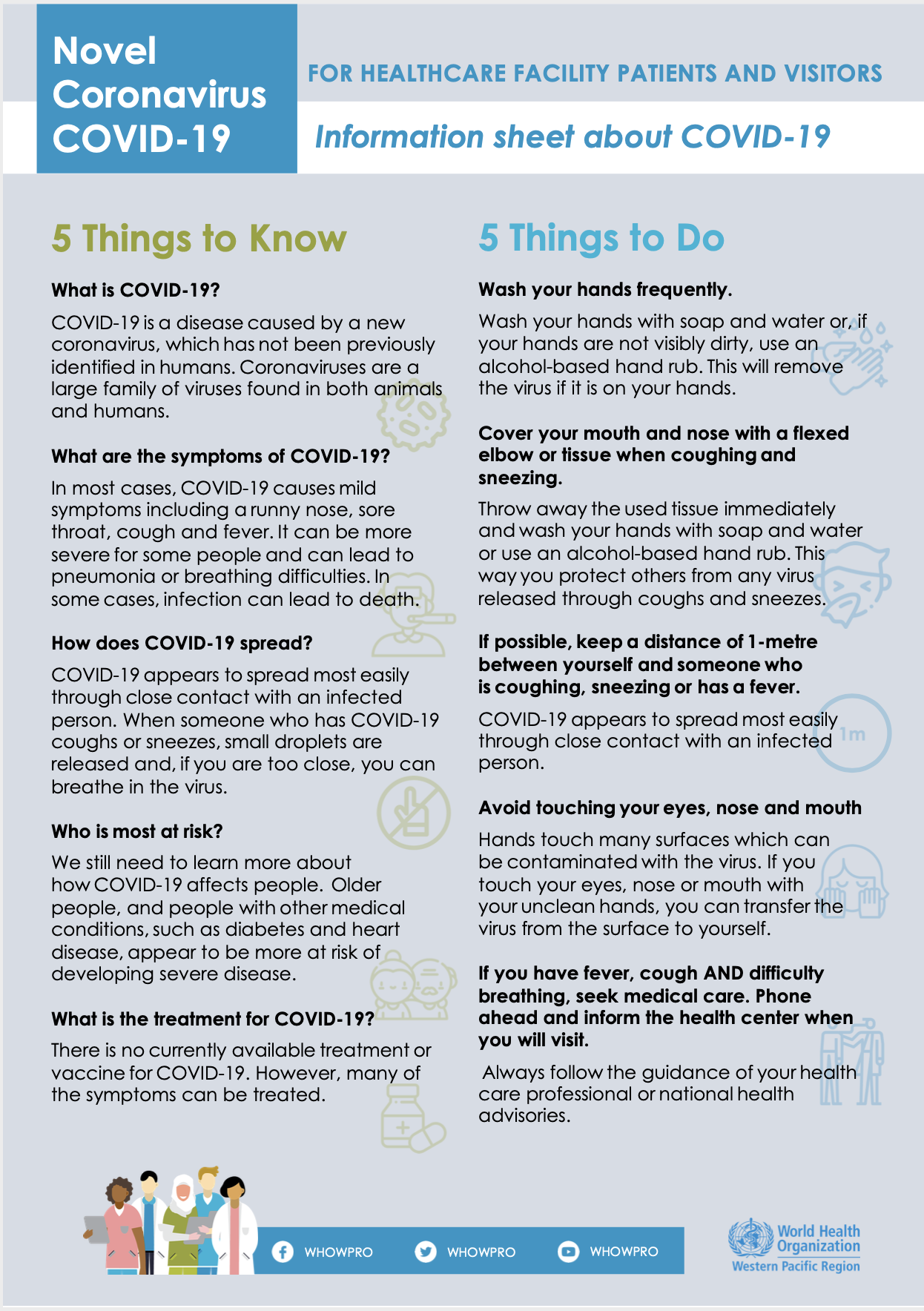
World Health Organization/5 Things to Know, 5 Things to Do
----
MARCH 5, 2020 (3:00 p.m.)
An Expert Answers Your Questions About COVID-19 (Coronavirus)
UNM infectious disease researcher Steven Bradfute, PhD, provides the latest information on the coronavirus.
----
MARCH 4, 2020 (2 p.m.)
How to Speak to Your Children about Novel Coronavirus
As news headlines warn of a worldwide pandemic around the spread of the COVID-19 coronavirus, it's not surprising that many people are on edge - and with all the unknowns children are especially vulnerable to worry.
Parents and teachers have an important role to play in reassuring kids, says Shawn Sidhu, MD, associate professor in The University of New Mexico's Department of Psychiatry & Behavioral Sciences and training director of the Child and Adolescent Psychiatry Fellowship Program.
For starters, it's important to emphasize that children are the least susceptible to the worst effects of the respiratory illness. And most people who do experience symptoms likely have something else. "We're still in the cold season," he says. "A lot of people are going to be getting sick and a very, very small proportion of them are going to have this virus."
Based on the latest information, "It seems to be that very few kids are getting severe symptoms," Sidhu says. Those most at risk "seem to be mostly elderly or people with an existing lung problem or people who are immuno-compromised."
But amid the avalanche of alarming media coverage, that message might get lost, he says.
"The main thing with kids is you're going to want to reassure them that they're safe, and that you're taking precautions," Sidhu says. "And even if you do get it, you'll probably be fine - it'll just be like any cold you've had."
Sidhu suggests that parents tailor the information they provide to their kids in an age-appropriate fashion. With preschoolers, for example, "we may talk about basic germ theory and hand hygiene."
Elementary school children are more likely to have some understanding of the disease and its effects. "For them, it's really reassuring them that they're safe," Sidhu says.
Teenagers offer a unique teachable opportunity. "With high school kids you can draw them into solutions," Sidhu says. "You could ask, 'As a class, what would you do?' You can get them to think creatively about how they would address it."
Those conversations also offer a chance to talk more generally about health, including nutrition, exercise, drug use and sexual activity, he says.
Sidhu notes that reports of patients succumbing to the coronavirus might upset students who are experiencing an anxiety disorder or serious medical illness - or those who have lost family members. "They're going to be more at risk, because it's going to touch a nerve that's already sensitive," he says.
Parents should make sure that their kids maintain their usual routines. "You really want to keep the activities that give them that structure and something to focus on," Sidhu says. "It provides something they can control."
And parents should also be wary of exposing themselves to too much worrisome information and manage their own anxiety about the disease outbreak.
"The important piece is you don't want to be so consumed that you're not present with your children," he says. "Try to turn the 24-hour news cycle off. Try not to get sucked into this paranoia, because you're not going to be able to be there for your kids."
Sidhu also suggests that rather than anxiously scanning news sites, parents visit an authoritative information source, like the Centers for Disease Control and Prevention, once a day to get updates. "There's no benefit to checking more than once a day," he says.
Parents and children alike should also focus on healthy, stress-busting behaviors that boost the immune system and lessen the susceptibility to infection, even when exposed to the virus, he says. These include familiar measures, like frequent and careful handwashing, but also include eating fruits and vegetables, getting sufficient sleep and exercising regularly.
In the end, Sidhu says, the most important advice is to keep things in perspective. "There's only so much that we can control," he says. "But what I can control today is enjoying this moment with my family."
----
MARCH 4, 2020 (11:30 a.m.)
UPDATE
Nestor Sosa, MD, division chief of Infectious Diseases for UNM Hospital, shares the latest update on the COVID-19 (coronavirus) outbreak in Spanish.
----
MARCH 3, 2020 (5:30 p.m.)
Meghan Brett, MD, University of New Mexico Hospital epidemiologist, gives us the latest update on the COVID-19 (coronavirus) outbreak.
----
MARCH 3, 2020 (3:40 p.m.)
Should I Get the Flu Shot Still?
Find out why Walter Dehority, MD, associate professor of pedicatric infectious disease at UNM Hospital, recommends getting a flu shot.
----
MARCH 2, 2020 (5:30 p.m.) UPDATE
Meghan Brett, MD, University of New Mexico Hospital epidemiologist, gives us the latest update on the COVID-19 (coronavirus) outbreak.
----
FEBRUARY 28, 2020 (8:00 a.m.)
What is Novel Coronavirus (and other FAQs)?
Steven Bradfute, PhD, is an assistant professor in UNM's Center for Global Health and Department of Internal Medicine who studies Ebola, Hantavirus and other deadly diseases. He has been closely monitoring the rapid spread of COVID-19 (coronavirus) across the world. Here, he answers some questions about this newly identified disease.
Where did this virus come from?
There are many coronaviruses that infect humans, four of which cause the common cold. More dangerous coronaviruses, such as Middle East Respiratory Syndrome (MERS), Severe Acute Respiratory Syndrome (SARS) and COVID 19, are all thought to have originated in animals before hopping into people. In the case of COVID-19, it's thought to be due to people eating infected animals that were bought in a market in Wuhan, China, that sold fish and wild-caught animals. Bats are a likely reservoir for the virus, but there has been some research suggesting it may have come from strange animal called a pangolin. SARS probably came from a bat or a civet cat and MERS came from camels.
How is it spread?
After the COVID-19 got into humans, it became transmissible from one person to the next. What's thought to be the primary route of spread is via the respiratory route - coughing on somebody. The droplets in the cough or sneeze get inhaled by another person, and the virus starts to replicate in their respiratory tract. A potential secondary route is coughing on a surface and then someone touches the surface and touches their nose and eyes. It's unknown how many viral particles are required to get infected - you probably don't need very many of them to get infected. The incubation period - the time between initial infection and the beginning of symptoms - is typically two days to two weeks.
What are the symptoms of this disease?
Right now the best guess is that about 80 percent of people experience few or relatively mild flu-like symptoms. About 20 percent get pretty ill, and some of those patients are hospitalized. Symptoms include fever, cough and shortness of breath. The mortality rate varies. From the numbers in China and Italy, it's 2 to 3 percent, but Iran, which has many fewer cases, reports about 10 percent (this could be due to underreporting of mild cases). SARS, which is the virus most closely related to COVID-19, had a 10 percent mortality rate. For comparison, the recent outbreak of Ebola in west Africa had a 40 to 45 percent mortality rate. The flu, which kills 20,000 to 30,000 people in the U.S. every year, has a mortality rate of about 0.1 percent. COVID-19 is more on par with the 1918 flu outbreak mortality-wise. If it gets widespread, that's the concern. This virus has spread much more rapidly than SARS. More people are getting sick in a shorter period of time. That could be due to the virus being more transmissible or a lot of people not being super-sick, so they're exposing others without realizing they're infected. We just don't know for sure yet.
What kind of treatments exist for patients diagnosed with this illness?
The primary one is supportive care, treating the symptoms. There are a couple of newer treatments being tested. One is Remdesivir, which was tried for Ebola. It wasn't super-effective in that instance, but it does show some activity in the laboratory against SARS. I'm sure people will be trying these and other treatments in human cases, but we don't know if they will work or not.
How can we control the spread of the disease?
Infection control (stopping the spread of the virus from person to person) is an old method, and it's extremely effective if you can do it. One of the problems is there's evidence you can spread COVID-19 before having any symptoms. There's even some evidence you might be able to spread it even if you are infected but don't get sick from it. But we don't know at this point whether it's the sick or not-sick people who spread the virus more often.
What about vaccines to protect people from becoming infected?
There are some vaccines that have been designed, and I expect they'll be moving into phase 1 clinical trials within a few months. It's too early to tell if we will have effective vaccines on the horizon, but there are many groups working on vaccine development.
Do you expect the rate of new infections to decline as summer approaches?
Respiratory diseases typically do tend to wane in the summertime. We're outside more, not crowded together inside, so there's less chance of transmission. There's also other reasons why respiratory viruses don't transmit as well in the summertime. So it's a possibility - for example, SARS transmission in the early 2000s puttered out around the month of May. It's something that could happen, but if transmission does decrease in the summer, it's possible that the virus could come back in the winter. But I don't think we really know if that will happen at this point.
----
FEBRUARY 27, 2020 (12:00 p.m.)
The coronavirus (COVID-19) outbreak that is spreading around the world has not yet reached New Mexico, but UNM Health Sciences experts are taking every precaution to mount an effective response in the event it does appear here.
While the disease originated in China in late December, it is not confined to a particular population or region. Cases have also been reported in Europe, the Middle East and South America - and even in a few places in the U.S.
UNM Hospital epidemiologist Meghan Brett, MD, offers some common-sense guidance about how to limit the spread of the disease (they're similar to the practices in place for other upper respiratory infections, such as influenza).
These include:
- Wash your hands often and thoroughly. Key times include after touching door handles and other surfaces that are frequently touched by other people, or after coughing. Use hand sanitizers.
- Try to reduce how often you touch your face - your eyes, nose and mouth are the commonest routes of infection. This takes practice: most of us touch our faces 150 to 200 times per day.
- If you think you might be sick (especially if you have a fever), stay home instead of coming into work. You'll recover more quickly there and you'll protect your coworkers and patients from infections. Remember to rest and drink plenty of fluids
- When coughing or sneezing, cover your mouth and nose with a tissue or sleeve. Don't cough or sneeze into your hands. Watch our video on how to properly cover your cough.
- Stay informed. Many new details about the spread of COVID-19 emerge each day. You will find some links below to sites that provide reliable and up-to-date information.
The take-home message is that we should take sensible precautions for all respiratory viral illnesses and continue to be prepared in case COVID-19 does start circulating here in New Mexico.
But there is no need to panic. Health care providers manage these risks every day and have the expertise and resources needed to deal with this disease.
Cristina Beato, MD, UNM's executive director of health policy, points out that this year's flu outbreak has given greater cause for concern. In the current flu season, more than 100 children and 16,000 adults have died, she says.
The Centers for Disease Control and Prevention (CDC) list the following symptoms for influenza:
- Fever
- Cough
- Sore throat
- Runny or stuffy nose
- Body aches, including headache
- Feeling tired
- Vomiting and diarrhea (usually more common with children)
According to the CDC, COVID-19 symptoms include
- Fever
- Cough
- Shortness of breath
To learn more about the latest developments in the COVID-19 outbreak, please visit:
U.S. Centers for Disease Control and Prevention
New Mexico Department of Health COVID-19 Website
Tracking of Coronavirus COVID-19 Global Cases by Johns Hopkins CSSE
-----
FEBRUARY 25, 2020 (3:00 p.m.) The Centers for Disease Control and Prevention (CDC) warned Americans on Tuesday to prepare for a coronavirus outbreak at home that could lead to significant disruptions of daily life. Coronavirus has only been seen in a few places in the United States and there is currently no person to person transmission ongoing in the United States or in New Mexico, according to Dr. Meghan Brett, UNM Hospitals epidemiologist and doctor of adult infectious disease.
"This is not the time to panic, but rather a time to prepare yourself," Dr. Brett says. She recommends the following actions to keep yourself safe and prevent the spread of infection:
- If you have cold, cover your cough.
- Wash your hands regularly.
- Stay home if you are sick.
- Get your flu shot.
